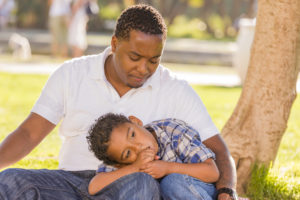One caveat as we begin: If one parent is actually abusive or otherwise harmful to the children, then the better parent’s avoiding the custody fight will not put the kids in a good situation. This article is intended for parents who are in the normal range of parenting abilities and styles.
Here’s the short version: Custody fights can be terribly stressful or even traumatic for kids.
The long version is more eloquent and more detailed. The excerpt below is quoted verbatim from the Family Mediation Resource Manual* provided by the Supreme Court of Virginia’s Dispute Resolution Services office, for the benefit of family mediators and their clients.
“It would be hard to overemphasize the negative impact of child custody litigation upon the children themselves. Children inevitably become aware of parental conflict and sense the animosity that the parents project toward one another. While this impact can be minimized by conscious effort to say or do nothing concerning the case in the presence of the children, in the large majority of cases, the children do suffer certain consequences as a result of the conflict. Quite often, the results are serious and permanent. The mediator should remind parents that children of divorced, separated, or non-married parties can be successful and well rounded. It is the children of conflict who suffer emotional damage.
Children almost always love both parents deeply and want to please both parents. In order to do this, they will say or do what they perceive their parents want. Parents interpret this behavior as confirmation that the children want to live with them, causing the parent to be more resolute in the conflict. As a result, the negative impact on the children is even greater. Older children quickly learn that they can play one parent against the other in order to get what they want. This manipulation is often not recognized by the parents. Still older children will tend to see the world in black and white, and will feel the need to find one parent to be right and the other wrong. When this occurs, a near complete breakdown can occur in the relationship with the parent perceived to be wrong. Unfortunately, the parent who seems to be winning in the child’s eyes often encourages this. Parties should be reminded that this is destructive to their child.
The stress felt by children who are the subject of custody litigation can be severe. Often this stress will be expressed in physical as well as emotional problems. Mediators should remind clients that mediation is an opportunity to minimize the litigation associated with separation and divorce. The impact of child custody litigation upon children can last their entire lifetimes. Resolution through mediation is a gift to the children’s well-being.”
 In other words, agreement on almost any reasonable parenting schedule is likely to be better for your children than continuing to fight for what you think would be the best parenting schedule for them. It is likely to be better for them than fighting for a fair outcome.
In other words, agreement on almost any reasonable parenting schedule is likely to be better for your children than continuing to fight for what you think would be the best parenting schedule for them. It is likely to be better for them than fighting for a fair outcome.
Giving up — letting the other parent win — can be terribly hard to do. But consider the classic story about Solomon making a custody decision that is included in Hebrew and Christian scriptures. As described on Wikipedia, it goes like this:
“Two young women who lived in the same house and who both had an infant son came to Solomon for a judgment. One of the women claimed that the other, after accidentally smothering her own son while sleeping, had exchanged the two children to make it appear that the living child was hers. The other woman denied this and so both women claimed to be the mother of the living son and said that the dead boy belonged to the other.
After some deliberation, King Solomon called for a sword to be brought before him. He declared that there was only one fair solution: the live son must be split in two, each woman receiving half of the child. Upon hearing this terrible verdict, the boy’s true mother cried out, ‘Oh Lord, give the baby to her, just don’t kill him!’ The liar, in her bitter jealousy, exclaimed, ‘It shall be neither mine nor yours—divide it!’
The king declared the first mother as the true mother, as a true, loving mother would rather surrender her baby to another than hurt him, and gave her the baby. King Solomon’s judgment became known throughout all of Israel and was considered an example of profound wisdom.”
 It is hard to imagine a real life case so extreme, but some come much too close. Parents fighting against each other about custody tear their kids apart, metaphorically speaking.
It is hard to imagine a real life case so extreme, but some come much too close. Parents fighting against each other about custody tear their kids apart, metaphorically speaking.
In any specific case, the parenting schedule one parent seeks might indeed be better for the children than the schedule the other parent advocates. But if the other parent cannot be persuaded of this and is willing to keep the children living in the war zone of custody and visitation battles between their parents, and if the proposed schedule will not cause serious harm to the children, might it be better to consent to it and let the children live in peace?
This is a painful argument to make. In practice, it might mean that the parent who is less able to see the children’s best interests clearly will win the battle to determine their schedule. Unlike the outcome in Solomon’s story, the better parent does not get the children. The one who refuses to give in, who may be unable to tell the difference between what is preferable to the parent and what is best for the children, gets the larger share of the children’s time. There is no guarantee that the children will understand or appreciate their better parent’s sacrifice. But if the parent who has them more of the time is mostly an OK or good parent, then they will be OK. They won’t grow up with traumatic memories of being torn apart inside by their parents’ struggles. They will be able to enjoy good relationships with both parents. They’ll be able to be kids and have fun. Isn’t that what you want?
–
Afterword: Good family mediators very rarely try to persuade a parent about what to do. We provide information and ask questions to help you determine what you think is best. You know your kids. Your mediator does not. Unlike a judge, your mediator will not tell you what you must do.
–
*The Family Resource Manual, first published in June 2006 and most recently updated in September 2016, was the result of the hard work and collaborative effort of the Dispute Resolution Services Family Mediation Committee.
